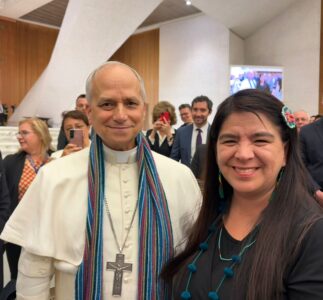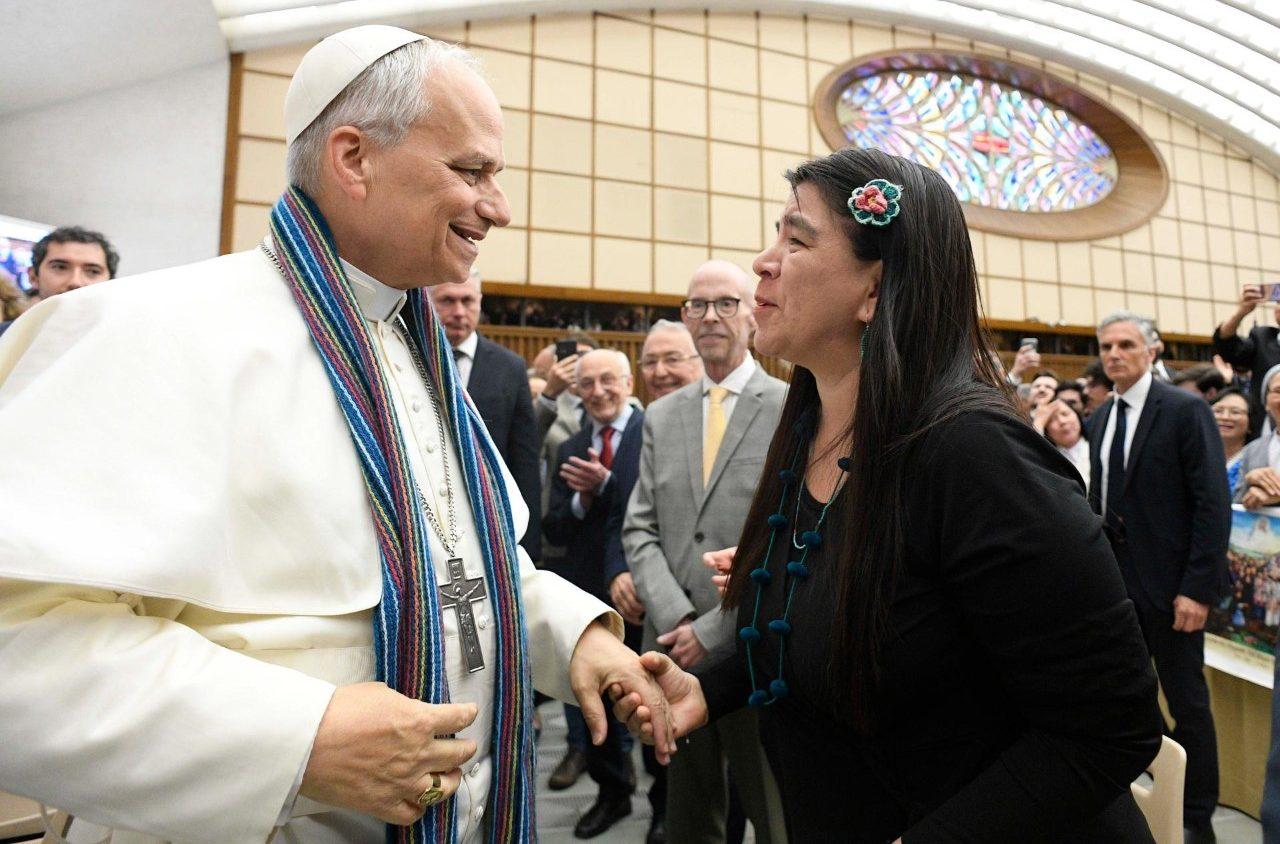ROME – In a speech to members of the international media Monday, Pope Leo XIV called for a rhetoric of peace over words of anger or ideology, and issued an appeal for the freedom of journalist imprisoned for reporting the truth.
After two rounds of thunderous applause that prompted him to stand up again once he’d sat down, Leo thanked journalists for the “this wonderful reception,” jesting in English, “They say when they clap at the beginning it does not matter much, if you are still awake at the end and you still want to applaud…”
In his speech, he voiced the church’s solidarity with journalists “who are imprisoned for seeking to report the truth,” and, to another round of applause, asked “for the release of these imprisoned journalists.”
“The Church recognizes in these witnesses – I am thinking of those who report on war even at the cost of their lives – the courage of those who defend dignity, justice and the right of people to be informed, because only informed individuals can make free choices,” he said.
Leo said the suffering of imprisoned journalists “challenges the conscience of nations and the international community,” and is a call to the international community “to safeguard the precious gift of free speech and of the press.”
Numerous journalists have lost their lives reporting on the conflicts in Ukraine and Gaza, and many have either been jailed or faced threats of being jailed due to their reporting.
Notoriously, in 2023 American Evan Gershkovich with the Wall Street Journal was detained by Russian police on charges of espionage and sentenced to 16 years in prison before being released in a prisoner exchange in August 2024.
Leo’s words also rang out in Peru, where he served as a missionary for some 30 years, including as Bishop of Chiclayo for nearly a decade, and where two journalists are facing a swath of legal complaints, including some with requests for imprisonment, related to their reporting uncovering abuse and alleged financial crimes within a powerful ecclesial group that was suppressed by Pope Francis earlier this year.
The journalists, Pedro Salinas and Paola Ugaz, broke news of scandals within the Sodalitium Christianae Vitae (SCV) in 2015 with the publication of their book in 2015, Half Monks, Half Soldiers, detailing years of physical, psychological, and spiritual abuse, as well as abuses of power, conscience and sexuality, on the part of its founder, Luis Fernando Figari, and other top-ranking members.
Ugaz was among the journalists who greeted Pope Leo Monday, gifting him an artisanal Peruvian scarf made by low-income women in the Andes and a box of Peruvian chocolates, which he jested were “the best part” of the gift, adding, “expect news of me in Peru soon.”

She has continued to report routinely on allegations of financial corruption in the SCV, including international money laundering to offshore holding companies in the United States, Panama, and the British Virgin Islands.
Salinas, who was in Rome for the election of Pope Leo XIV on May 8, was not present for the pope’s meeting with representatives of the media because he had to return to Peru for a hearing as part of a case against him launched by individuals with ties to the SCV who are requesting seven years in prison over charges involving collusion which he says are completely false.
In his speech, Leo called on journalists adopt a communication style “that does not seek consensus at all costs, does not use aggressive words, does not follow the culture of competition and never separates the search for truth from the love with which we must humbly seek it.”
“Peace begins with each one of us: In the way we look at others, listen to others and speak about others,” urging journalists to “say ‘no’ to the war of words and images, we must reject the paradigm of war.”
He thanked journalists for their “service to the truth,” saying over the past weeks they have reported not only on the church and its diversity, but also “its unity.”
This was evident in the shared celebration of Holy Week and Easter, as well as the death and funeral of Pope Francis, and later into the conclave, “during which you worked long and tiring days.”
“Yet, even on this occasion, you managed to recount the beauty of Christ’s love that unites and makes us one people, guided by the Good Shepherd,” he said.
Leo referenced the complicated nature of modern times, which he said is difficult to navigate and recount, but said this is a challenge “we should not run away from.”
The complexity of modern times, he said, demands “that each one of us, in our different roles and services, never give in to mediocrity. The Church must face the challenges posed by the times.”
He thanked journalists for what they have done “to move beyond stereotypes and clichés through which we often interpret Christian life and the life of the Church itself,” and he also voiced gratitude for capturing “the essence of who we are” and conveying it to the world in every media genre.
“One of the most important challenges is to promote communication that can bring us out of the ‘Tower of Babel’ in which we sometimes find ourselves, out of the confusion of loveless languages that are often ideological or partisan,” he said.
In this sense, Leo said the language and style that journalists adopt “is crucial,” as communication is not just conveying a message, but creating culture, both human and digital.
To this end, he pointed specifically to the growth of artificial intelligence, “with its immense potential, which nevertheless requires responsibility and discernment in order to ensure that it can be used for the good of all, so that it can benefit all of humanity.”
“This responsibility concerns everyone in proportion to his or her age and role in society,” he said.
He closed his message quoting Pope Francis’s message for the World Day of Social Communications, saying, “let us disarm communication of all prejudice and resentment, fanaticism and even hatred; let us free it from aggression.”
“We do not need loud, forceful communication, but rather communication that is capable of listening and of gathering the voices of the weak who have no voice,” he said, saying that to disarm words will help to “disarm the world.”
“Disarmed and disarming communication allows us to share a different view of the world and to act in a manner consistent with our human dignity,” he said, saying journalists are on the frontlines of reporting both conflicts and efforts for peace, on injustice and poverty, and the work being done for a better world.
For this reason, he said, “I ask you to choose consciously and courageously the path of communication in favor of peace.”
Follow Elise Ann Allen on X: @eliseannallen











